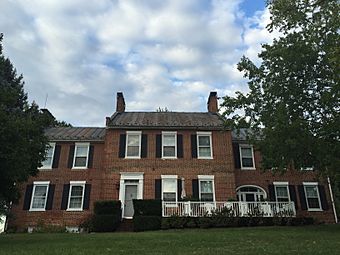Annington (Poolesville, Maryland) facts for kids
Quick facts for kids |
|
|
Annington
|
|
 |
|
| Location | 24001 White's Ferry Road, Poolesville, Maryland |
|---|---|
| Area | 197 acres (80 ha) |
| Built | 1813 |
| Architectural style | Georgian |
| NRHP reference No. | 78001474 |
| Added to NRHP | December 11, 1978 |
Annington is a historic house located in Poolesville, a town in Montgomery County, Maryland, United States. This special house is built from brick using a technique called Flemish bond. This means the bricks are laid in a pattern that makes the walls extra strong and look nice.
The house has three main parts, each two stories tall. It was built around 1813, a time when farming was booming in Maryland and Virginia. This was thanks to the new Chesapeake and Ohio Canal, which made it easier to transport crops like wheat.
Contents
Discovering Annington: A Historic Home
Annington is a great example of Georgian architecture. This style was popular in the 1700s and early 1800s. The house has a main section with three "bays," which are like vertical sections of the building, often marked by windows. It also has two wings, one on each side, adding more space.
The way the house is built, with its strong brick walls and classic design, shows how important it was in its time. It sits on a high spot, giving it a great view of the Potomac River.
Built for a Maryland Leader
Annington was built for a man named Daniel Trundle. He was a "planter," which means he owned and managed a large farm. Daniel Trundle was also a member of the Maryland General Assembly, which is like the state's government body that makes laws. He served there for ten years, helping to shape Maryland's future.
The house was built during a time when the western parts of Maryland were growing fast. The opening of the Chesapeake and Ohio Canal helped farmers send their wheat and other goods to markets. This made the area very prosperous, and Annington was a sign of that success.
Annington During the Civil War
Because of its high location overlooking the Potomac River, Annington was a very important spot during the American Civil War. It served as a "strategic lookout point." This means it was a good place to watch for enemy movements.
Union officers, who were part of the United States Army, actually used Annington as their base. They could keep an eye on the surrounding area and the river, which was crucial for military planning during the war.
A Recognized Landmark
Annington is so important that it was added to the National Register of Historic Places in 1978. This is a special list of places in the United States that are considered historically significant. Being on this list helps protect the house and its history for future generations to learn from and enjoy.



